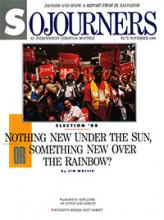Exactly eight years ago, Sojourners printed a special issue titled, "What Does It Mean to be Pro-Life?" Members of the traditional anti-abortion movement had prescribed an acceptable "pro-life" position as one that argued for a constitutional amendment banning abortion. Nothing less would do, and nothing more was deemed necessary.
Confessing our own lack of clarity about specific legal remedies for abortion and our mixed feelings about the Right to Life movement, we nevertheless declared our opposition to abortion. And we argued that the "pro-life" label, to be true and accurate, should reflect a commitment to the sanctity of all life, born and unborn.
It was a definition that stretched and challenged two dissimilar and often antagonistic groups to be consistent in their values and to unite around a shared reverence for life. Peace and justice groups that opposed nuclear weapons, capital punishment, and violence were encouraged to see opposition to abortion as another issue of preserving and protecting life; while anti-abortion groups were urged to be as concerned about women's rights and life after birth as they were about life in the womb.
While that argument, more recently referred to as the "seamless garment" ethic, has won some converts over the years, abortion has continued to divide people and groups more than unite them. Most peace and justice groups remain "pro-choice" on the issue; the vast majority of persons affiliated with the Right to Life movement have not wavered in their support for nuclear weapons and capital punishment or their opposition to equal rights for women and many social programs; and even the churches have been unable to agree on abortion. Sojourners remains committed to the sanctity of all life.
Read the Full Article
